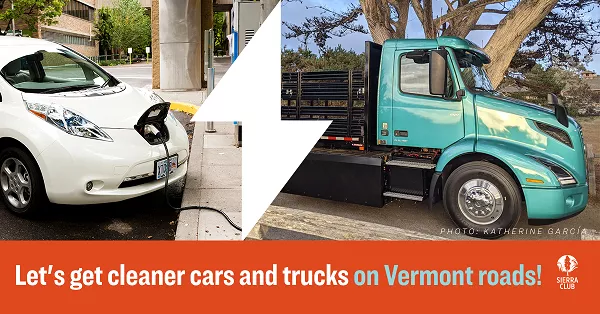
This commentary was originally published Sept 27, 2022, in the Rutland Herald and Times Argus as Kidd: Clean vehicles rules
Here in Vermont, we drive more miles and burn more gasoline and diesel than the average American. There aren’t a lot of great options for the commuters or contractors or small businesses among us to get ourselves out of cars or trucks and into more efficient modes of transportation like buses and trains, especially for those more than 70% of vehicle trips that are in rural areas.
While our ability to reduce miles driven is rather limited by our rural geography, for the sake of the climate, clean air, and our personal pocketbooks–we have to find a way to replace our current gas- and diesel-guzzling fleets with cleaner, more affordable vehicles.
The Agency of Natural Resources has at the moment a great opportunity to accelerate this transition to a clean vehicle fleet. A suite of clean vehicles rules—formally called Advanced Clean Cars II (ACC2), Advanced Clean Trucks (ACT), and Low NOx Heavy Duty Omnibus (HDO) for trucks and trailers–are currently being considered by the agency, and adopting the whole lot would make great progress in cutting greenhouse gas emissions from the transportation sector, while keeping Vermont’s air quality among the best in nation, and saving Vermonters money on their commutes and work routes.
One of these rules, ACC2, would require automakers to offer a gradually increasing percentage of zero-emission vehicles(tailpipe emissions) within the Vermont market, eventually putting the state’s car and light truck sales on a pathway toward 100% electric vehicle (EV) sales by 2035. This is right in line with the legally-mandated requirements of the Global Warming Solutions Act of 2020.
Meanwhile, the Advanced Clean Trucks rule would similarly require auto manufacturers to sell an increasing percentage of zero-emission medium- and heavy-duty trucks between model years 2026 and 2035.
These rules don’t force consumers to buy anything they don’t want. They simply demand that manufacturers make the latest and greatest zero-emission vehicles available for us Vermont drivers who stand to benefit the most from their cheaper ownership costs.
That’s right: all-electric vehicles are already cheaper to own and operate than their gasoline and diesel powered counterparts. Research by Drive Electric Vermont has found that, despite higher upfront costs to purchase the vehicles, electric car and truck drivers can save up to $1,500 each year on cheaper fuel and maintenance costs. Combined with some added incentives recently approved by the state legislature, the sales mandates of the clean car and truck rules should help bring even those initial costs down to parity with internal combustion vehicles, making clean zero-emission vehicles even better for your personal transportation budget.
The Agency of Natural Resources just wrapped up some listening sessions throughout the state on these rules, and heard repeatedly— from transportation and climate experts and regular drivers alike — that manufacturers are ready to deliver these vehicles affordably to the public and that Vermonters want the option to drive electric. The Scott administration has the clear authority to adopt these rules, and the public support to do so. It’s imperative that ANR adopt these clean car and truck rules by the end of 2022 for Vermonters to capture their full benefits. Vermonters are ready for clean all-electric vehicles, and we need to make sure they’re available to us as soon as possible.
Robb Kidd, Vermont Sierra Club Conservation Program Manager.